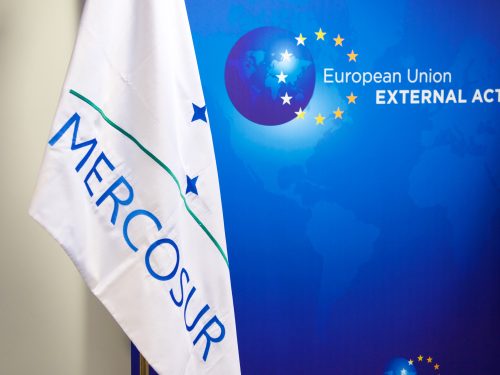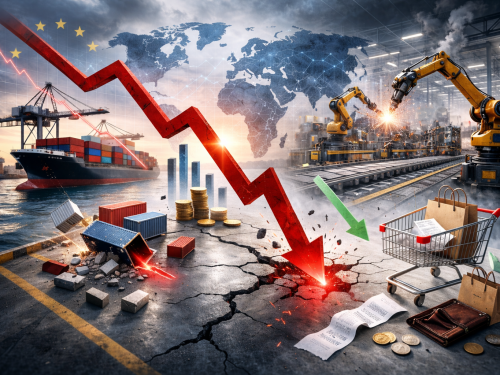It was presented "Factory Europe' the document containing Confindustria's recommendations for a competitive Europe.
Summary foreword by Carlo Bonomi and Stefan Pan
The future of Europe is linked to industry, which only if it is competitive can guarantee prosperity, welfare and social peace on our continent (Industrial Renaissance).
Europe plays a fundamental role in the life of Italian companies: the domestic market is now our main reference (more than 50% of Italian exports take place in the EU) and European rules establish more than 70% of the relevant regulations. The European Parliament that will be elected next June must quickly take strong and decisive action.
Confindustria has always worked to make the voice of Italian companies heard in Brussels. And it wants to continue to do its part, not limiting itself to denouncing the brakes and bottlenecks that slow down the economy, but proposing concrete actions and principles that, in our opinion, must be the compass for future decisions in Europe. For this reason, the entire system has been consulted in recent months, both at territorial and sectoral level, to contribute to the definition of an organic framework of proposals to make Europe more competitive.
"Factory Europe' is the result of this widespread consultation. A series of recommendations with a single common denominator: to put industry back at the centre of the European agenda, building a strong industrial policy based on the three facets of sustainability (environmental, social and economic) and supported by an appropriate level of investment.
Before the European elections, the Confindustria System will organise a series of meetings in all European constituencies for a direct confrontation with the candidates on the contents of the document. We must abandon the ideological approach that has emerged in recent years in Europe, and confront each other with ambitious and 'workable' solutions.
Being competitive with the rest of the world
- Strengthen and expand the network of free trade agreements (FTAs) and ensure their implementation. It will be necessary to move forward on the recently relaunched negotiations, in particular MERCOSUR, and to open new ones to intensify bilateral relations with the countries and economic integration blocs of Asia (in particular the ASEAN countries), Africa and Latin America.
- Ensuring a level playing field and protecting the interests of European companies.
- Strengthening common European defence and improving coordination between the EU and NATO.
European policies for industrial competitiveness in the green transition
- Accompanying the Green Deal with a European industrial policy to stay ahead in the global race for future technologies. It is important to adopt a technology-neutral approach, and to establish European funds that support and complement investments in the various technologies and energy sources. The new rules on sustainable finance designed to profoundly change business relations between companies and between companies and the financial system should also be implemented gradually and proportionately, including by establishing simplified standards for SMEs.
- Complete the integration of electricity markets, create a single gas market and develop a European strategy for nuclear energy. The European electricity market should strive for an effective integration of renewables, decoupling them from short-term markets and gas. In parallel, in order to regularise cross-border gas trade and move towards a harmonised European tariff system, it is important to promote the creation of a single market for natural gas and renewables. Europe should also equip itself with a shared strategy on nuclear power and give member states clear guidelines for the construction of innovative plants that can concretely contribute to decarbonisation goals. Nuclear power is regaining an important and strategic role in the energy mix of the future, with EU and non-EU countries continuing to rely on this energy source. This technology can contribute to the decarbonisation of the EU economy, complementing electricity production from renewable sources, which also needs zero-emission programmable plants alongside storage systems. New perspectives may also come from small-scale nuclear power and, in the future, from fusion technology.
- Reform the ETS (Emission Trading Scheme) rules and strengthen the CBAM (Carbon Border Adjustment Mechanism).
- Promoting the circular economy and industrial symbiosis in business models. A clear and comprehensive regulatory framework that can stimulate innovations for the efficient use of productive resources must be defined and harmonised.
European policies for industrial competitiveness in the digital transition
- Enhancing e-skills in the training of workers in all sectors. There is an urgent need to improve the attainment of digital skills and to address the substantial shortage of qualified cybersecurity professionals by spreading a cybersecurity culture in the company.
- Regulate artificial intelligence to make the EU the ideal continent where to invest in this technology. The implementation of the Artificial Intelligence Act and future legislation on the subject will have to find an effective synthesis between the interests of different economic sectors in order to make Europe a major player in the development of technology and AI-related applications.
- Promoting the transition to the data economy. Enhance the information assets of European companies and public administrations. Promote the creation of data spaces, such as the European Health Data Space, that provide quality data and ensure the protection of companies' research and innovation activities.
Transport and Infrastructure
- Complete the Trans-European Transport Network (TEN-T) on time.
- Ensure a transition path to green mobility that considers multiple solutions, in line with the principle of technology neutrality.
- Creating a synergetic regulatory framework between transport and environmental legislation. This framework will have to be able to ensure a level playing field for freight transport, with a focus on the development of intermodal and combined transport. This must include a greater emphasis on the integration of the various economic sectors and the removal of obstacles, including regulatory ones.
Strengthening the Internal Market for Business Competitiveness
- Ensuring uniformity in the application of EU law. It is necessary for the Member States to implement EU law in a uniform and consistent manner in order to avoid the phenomenon of 'gold plating', which results in excessive national requirements being added on top of what is stipulated in EU law.
Balanced budgets, cohesion policy and investment to support competitiveness
- Relaunching the Capital Markets Union. In the coming years, it will be necessary to give new impetus to the development and integration of European financial markets in order to attract patient capital from institutional investors and to facilitate access to capital markets, particularly by SMEs.
- Creating a new common European debt safe asset on the Next-Generation Eu model. New financial instruments are needed to support investments and address the impact of the double transition - green and digital - on production and labour.
- Ensure that the regulation of the banking system really enables banks to support business development. The Basel III reform should therefore be implemented gradually, facilitating the renegotiation of loans and supporting corporate financing aimed at sustainable and digital transition.
- Ensure that cohesion resources are preserved in the new programming of the Multiannual Financial Framework (MFF) and that the needs of the business world are duly taken into account, both in terms of substance and method.
An inclusive, sustainable and competitive European social model
- Promote the adoption of appropriate instruments to manage employment transitions, relaunch active labour policies and foster employability.
- Promoting lifelong learning.
Competition Rules, Mergers and State Aid
- Redefine existing state aid instruments so that they are better adapted to the specific needs of businesses. It is essential to provide for facilitative measures for mid-caps and small mid-caps, to adjust the criteria for defining SMEs on the basis of inflation, to remove excessive constraints to facilitate large companies and to simplify and speed up IPCEI (Important Projects of Common European Interest) procedures.
- Providing common resources for all Member States to facilitate large production projects in order to reduce the risks of fragmentation and inequality linked to different budgetary capacities and ensure uniform growth in the context of the single market.
Research, Innovation and Intellectual Property
- Preserve the centrality of the patent system and its attractiveness for investment.
- Ensure support for investment in research and innovation by ensuring greater coherence and better synergies between EU programmes and national initiatives, with a focus on the impact and concrete results of funded projects. Align EU policies with funding programmes, facilitating the implementation of transformative industrial projects. Promote greater industry participation in European programmes, structuring them (especially Horizon Europe) according to greater flexibility, in order to strengthen European development plans, including the Industrial Plan for the Green Deal.
- Pursue greater autonomy and contribute to the strengthening of Europe's position in the production and supply of health goods and services.
Better regulation to support business competitiveness
- Strengthening the control of competitiveness. It is essential to enhance the assessment of competitiveness in every policy and legislative decision-making process, including policy documents, strategies, fiscal measures and international agreements. Specifically, it is strictly necessary to thoroughly analyse the different regulatory options available, including possibilities for self-regulation, sharing of best practices and adoption of codes of conduct. This monitoring process should ideally be split into two distinct levels: a technical one, incorporating the monitoring of competitiveness in impact assessments (to quantify the effect of each initiative), and a political one for the definition of long-term strategies. To this end, not only should the collegial confrontation within the European Commission be strengthened, but an Executive Vice-President of the Commission responsible for monitoring competitiveness should be appointed and called upon to engage in a continuous political dialogue with the Council of the European Union, the European Parliament and the social partners.
- Reform the use of Delegated Acts and promote transparency in the commissioning of impact assessments.
- Ensure greater harmonisation and consistency in the context of European industrial permitting.




